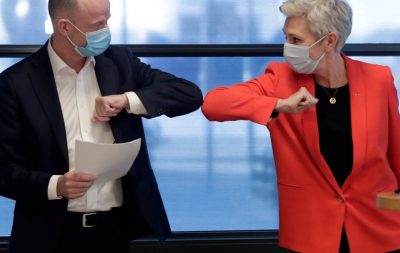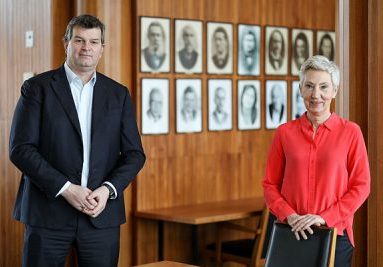NEWS ANALYSIS: Fury, frustration and sorrow preceded the ceremonial start of annual wage talks on Wednesday between Norway’s largest trade union federation LO and national employers organization NHO. Prospects for strikes this spring are high, even in the midst of the pandemic, after NHO’s leader demanded that workers accept an actual decline in purchasing power even before talks began.

Ole Erik Almlid, who earns a hefty NOK 3.7 million himself, set the stage for conflict earlier this month when he offered a preview of NHO’s position:
*** Neither he nor NHO think workers should receive any more than a 2.2 percent wage hike this year, even though average price growth has been set at 2.8 percent. LO is demanding at least 2.8 percent, so its members won’t lose purchasing power and can keep up with expected inflation.
*** NHO also wants to raise the ceiling for what’s considered low pay in Norway (currently around NOK 300,000 a year), making it more difficult for workers like hotel maids and others earning less than 90 percent of a factory worker to qualify for extra union-negotiated pay to narrow the gap. LO claims that will only widen the pay gap and increase social differences among Norwegians. It will demand the extra pay boost (called a tillegg) for its lowest-paid members.
Almlid’s aggressive positioning in Norwegian media sparked immediate protests, especially since Norwegian industry has actually continued to do well during the pandemic. Many large companies have reported strong profits, and the commission that sets the projected inflation and industrial profitability numbers (called TBU) recorded the largest collective profits since 2008.
Economic prospects from other reliable sources, including Norway’s central bank, are also bright. Norges Bank predicted rapid economic recovery this autumn, or just as soon as most Norwegians get vaccinated. When the bank’s governor Øystein Olsen confirmed last week that interest rates are likely to rise later this year, and sooner than expected, it’s mostly because unemployment will decline and consumption will increase, fueled by a marked rise in household savings over the past year when Norwegians couldn’t travel, go out to eat or even shop. Oil prices are also expected to rise, and that’s always good news for Norway’s economy.
NHO downplays all the strong economic prospects and the fact that many businesses are doing well apart from the travel, hotel, restaurant and entertainment industries and some parts of the retail sector. “We’re still in a time when very many companies (NHO members) are struggling,” Almlid told newspaper Klassekampen in defending raises lower than price hikes. “There are still (around) 200,000 people laid off, and rising unemployment. Lots of businesses are down for the count and it will take time for them to recover.”

He claims it’s more important to ensure that laid-off workers will have jobs to return to when the pandemic subsides and the anti-infection rules that have shut many businesses are eased. He also cites a need for Norwegian business and industry to remain competitive with its trading partners abroad, where price growth may be lower than in Norway.
Asked whether it’s correct to expect many households that have had a tough year to accept a decline in purchasing power, Almlid said he believes it is: “The difference between a good or bad life in Norway is whether you have a job or you don’t. If unemployment remains high, it can have long-term consequences.” He said he can understand that many think “we don’t want folks to get anything, but right now it’s important to stand together with those without work.”
When confronted with NHO’s own statistics showing that competitiveness improved by 9.6 percent last year and that hourly pay growth was lower in Norway than other countries, Almlid responded that it’s more important to view it over several years, not just 2020 when Norway’s weak currency provided competitive advantages.
Then newspaper Aftenposten challenged NHO’s incoming president Svein Tore Holsether, chief executive of Norwegian fertilizer giant Yara, to subject Almlid and other well-paid NHO staff to negative pay growth this year as well, with raises lower than 2.8 percent. Holsether, who earned NOK 14 million (USD 1.6 million) at Yara last year, dodged the issue, noting how he hadn’t assumed his new NHO position yet.
‘Cowards’
Fury rose after Almlid and the leaders of Norway’s biggest bank, DNB, and leading grocery store chain Coop, refused to appear live on Norwegian Broadcasting (NRK) popular debate program Debatten. Newspaper Dagsavisen branded them all as “cowards” in an unusually harsh editorial last week. Almlid’s unwillingness to subject himself to questioning live on national TV was interpreted as “a sign that he’s already made a mess of things. NHO has presented such a poor position that it can’t be publicly defended.”

NHO’s demands have been widely branded as “unacceptable,” not least by LO leaders who were heading into negotiations just a day after the funeral of their highly respected and popular boss. Hans-Christian Gabrielsen’s sudden death from a heart attack on March 9 came as a shock to all involved and forced postponement of the negotiations until March 24. Now it’s up to his successor Peggy Hessen Følsvik to take over as Almlid’s new counterpart, and she’s ready for battle amidst sorrow.
“Our starting point is to maintain purchasing power,” Følsvik told news bureau NTB. “Otherwise we’ll conduct our negotiations around the negotiating table,” she added, in a not-so-subtle jab at how Almlid seemed to start them in the media. Følsvik nonetheless insisted that Norwegian workers can’t expect to emerge from the Corona crisis with what amounts to a real wage decline. She has also made it clear that LO will also demand some relief for the lowest paid workers. “LO won’t accept any real wage decline and weaker purchasing power,” she told NRK Wednesday morning.
She later stated, as negotiations began, that “this pandemic has shown the value of the contributions of a long list of worker groups. There are many who deserve pay raises. It’s clear that ensuring purchasing power and income security is what people need now.”
Politician offer her own challenge
Others note that the two sides, LO and NHO, are much farther apart than usual at the start of talks, and that they can quickly break down with conflict levels high. Adding to the labour drama was the conservative Progress Party’s outgoing leader Siv Jensen’s suggestion late last week that teachers and nurses should get extra pay this year, as a reward for their heroic efforts during the Corona crisis. That, however, would divert Norway’s established negotiating process that sets standards for leading industries (so-called frontfag) first that all other sectors generally follow.
Jensen’s proposal was at least initially welcomed by the leaders of the teachers’ and nurses’ unions, further fueling prospects for conflicts and even strikes ahead. “We’re prepared there may be a strike,” Ståle Johansen, union leader at the Kværner Verdal yard in Trøndelag, told NRK on Wednesday. “With NHO and Almlid going out so aggressively in their arguments for a real pay decline, I think the risk of a strike is greater this year.” He predicted a “tough” negotiating session ahead. While Almlid thinks such a decline equates to “moderation,” others call it anything but.
“This year’s wage negotiations will be extremely demanding,” claimed NRK commentator Magnus Takvam on national radio Wednesday morning. “They’ll be full of conflict, right in the middle of a major national crisis.” Other commentators, also in business newspaper Dagens Næringsliv (DN), have suggested that’s unfortunate, not least given all the uncertainty that still lies ahead. DN noted that Gabrielsen’s experience and temperament will be sorely missed around the table, even though Følsvik “will fill his role well.” It’s unlikely LO can count on much sympathy from NHO.
Initial talks between LO and NHO will run through Thursday. If there’s no agreement, they’ll head into mediation right after the Easter holidays, on April 9-10.
NewsInEnglish.no/Nina Berglund

